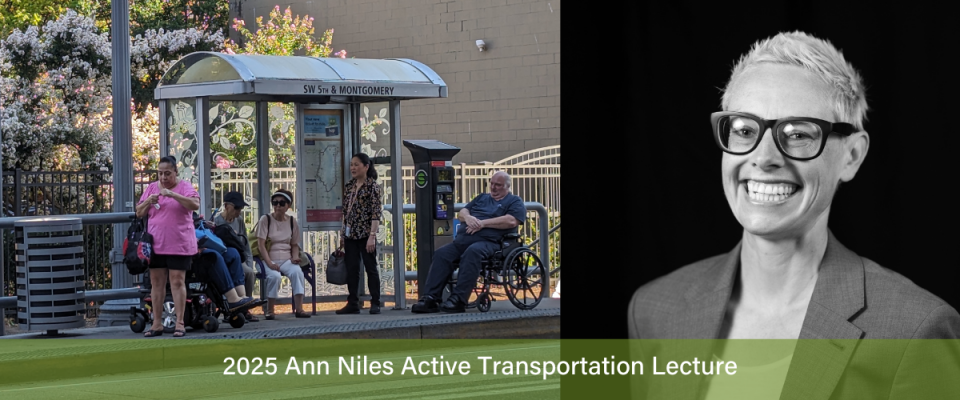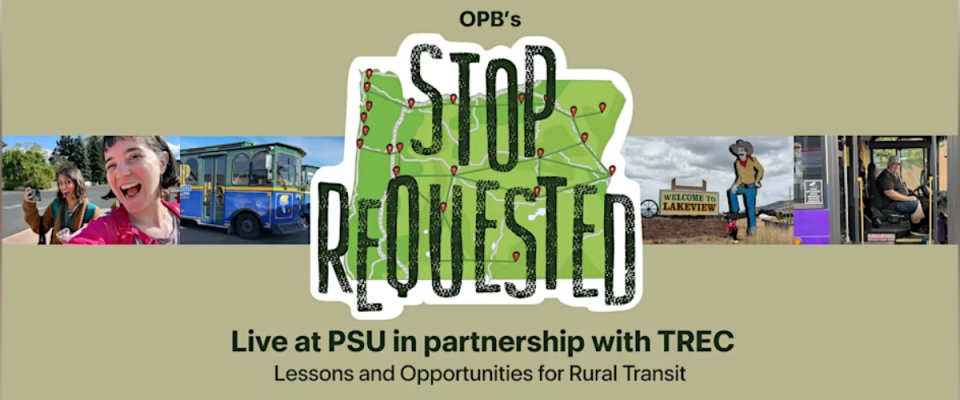This event will begin at 5:30 PM, Pacific Time, with doors opening at 5.
Each year, the Transportation Research and Education Center (TREC) at Portland State brings a world-class speaker to speak on active transportation with the support of an endowment from Ann Niles.
THE SPEAKER
This year, we’re pleased to host Anna Zivarts. Anna is a low-vision parent, nondriver and author of When Driving Is Not an Option: Steering Away from Car Dependency (Island Press, 2024). Anna created the #WeekWithoutDriving challenge and is passionate about bringing the voices of nondrivers to the planning and policy-making tables. Anna sits on the boards of the League of American Bicyclists, the Pacific Northwest Transportation Consortium and the Washington State Transportation Innovation Council. She also serves as a member of TRB's Committee on Public Health and Transportation (AME70) and the National Aging and Disability Transportation Center Coordinating Committee.
THE LECTURE
One third of people living in the United States do not have a driver's license. The majority of involuntary nondrivers are disabled, lower income, unhoused, formerly incarcerated, undocumented immigrants, kids, young people, and the elderly. They are also largely invisible due to a mobility system designed almost exclusively for drivers. When Driving is Not an Option shines a light on the reality for non-drivers and explains how improving our transportation system with nondrivers in mind will create a better quality of life for everyone.
THE TICKETS
"When Driving Is Not An Option: Steering Away From Car Dependency" will be held at PSU's Lincoln Recital Hall, Room 75, in the basement. The event is free, but tickets are required: Register here.
ADD THIS EVENT TO YOUR CALENDAR
To request reasonable accommodations, contact us at 503-725-2896 or asktrec@pdx.edu. In order to ensure that accommodations can be provided in time for this event, please make your request within seven business days before the event.
By promoting dialogue across disciplines and interests, this lecture series supports PSU's mission to "let knowledge serve the city." The annual lecture serves as a legacy to Ann Niles, who was a strong advocate for livable neighborhoods and safer pedestrian and bicycle infrastructure and served on many transportation-focused boards and committees in Portland. The forum furthers the mission of our Initiative for Bicycle and Pedestrian Innovation (IBPI) program to facilitate the exchange of knowledge among scholars, practitioners and community advocates around issues of active transportation. The Ann Niles speakers offer a fresh perspective and driving passion for safe, healthy, and sustainable active transportation. Learn about past Ann Niles Active Transportation Lectures.
MOVING BEYOND CARS IN SPRING 2025: JOIN US MAY 8
TREC is hosting a pair of events this spring focused on getting around without a car. Car dependency isn’t the answer for everyone, for all sorts of reasons. So after attending the Ann Niles Lecture with Anna Zivarts, we hope you can join us on May 8 for OPB's Stop Requested Live at PSU, an exploration of rural transit with Lillian Karabaic of Oregon Public Broadcasting.





